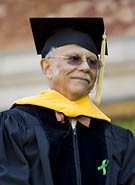Address by Warren M. Washington
An unedited transcript of Commencement 2008 remarks by Warren M. Washington, who received the honorary degree Doctor of Science.
 Thank you very much. I want to give a special thanks to Trish Morse, the faculty, the students, and the staff of this wonderful institution, that we up here are all honored. But we are honored by seeing all of you out there.
Thank you very much. I want to give a special thanks to Trish Morse, the faculty, the students, and the staff of this wonderful institution, that we up here are all honored. But we are honored by seeing all of you out there.
I’m very pleased to see that the graduates have taken on the pledge of social responsibility. I’ve got my little green ribbon on, which I think sort of represents an attitude about the future generations in terms of climate changed and being responsible for the environment
I earned my reputation as a young scientist in the early 1960s in building computer models of the climate system. Those models were very primitive, partly because we didn’t understand much about how the climate system, and we have very primitive computers at that time. Over the last four decades, we’ve learned how to understand better how the climate systems works: that means the atmosphere, the oceans, the sea ice, and the ecology. All of these are integral parts of these massively large computer models that are run on supercomputers.
It used to be a small set of individuals doing this work four decades ago. Now we have large teams of scientists. When we have workshops now, we have something on the order of four or five hundred young people who are taking part in building better and better models. I might point out that with the models we are able to understand much better the warming climate system. We can even understand how ocean fish stocks change in the future. We can understand the role of increasingly land cover and population change. All of these are very severe problems we will face in the future. Our goal is to have a sustainable planet, where we are able to live and make use of this planet, but at the same time keep it sustainable for future generations.
Another thing I would like to mention is that we can hopefully decrease the tension between nations. If we have a clear separation between the poorest of the world from the wealthiest of the world, I think that is going to lead to political instability and affect all of us in the future. I think we are learning how to live together in this very diverse world. But we need to keep working on that.
I want to end up by saying that when I graduated, much like you, I had no idea what I was going to end up doing. But I found little niches of opportunity, which gave me the opportunity to contribute to this very important problem of climate change. You will be finding those niches in the future that will lead you in unpredictable ways into your future. Thank you very much.